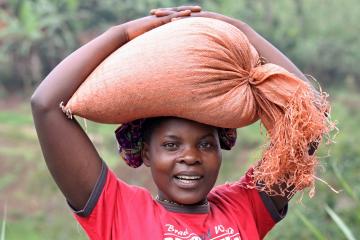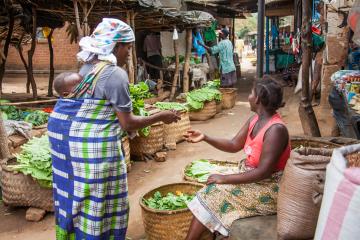
When low-income families receive cash with no strings attached, their lives improve in measurable ways.

Policymakers and funders should include unconditional cash transfers in their policy toolkits. Unconditional cash transfers raise people’s incomes, increase their food security, and improve their mental health, with lasting impacts.
Cash without conditions allows families the flexibility to meet their own needs. Recipients use funds to feed their families and invest in their futures—and they aren’t more likely to use funds on items like alcohol or cigarettes, nor do they work less.
Cash without conditions lets people experiencing poverty make their own choices. Unconditional cash transfers (UCTs) provide direct financial assistance to eligible households without conditions recipients need to meet to receive the funds. This straightforward approach allows people to make choices about how to spend the funds based on their unique circumstances.
Evidence from over 100 studies of UCTs demonstrates their potential to meaningfully improve people’s lives. Recipients of UCTs report better food security, higher income and savings, increased spending, and better psychological well-being. They’re more likely to pay off debts and be employed, and their children are more likely to be enrolled in school. As a result, the well-being of individuals and families improves. And, studies find that some of these effects can persist for years.
Recipients use the cash wisely. Study after study shows that recipients aren’t any more likely to spend the cash on purchasing items like alcohol or cigarettes. And, importantly, cash recipients continue to seek and find employment.
The benefits of UCTs can extend beyond the household. One study looked at the effects of UCTs on local economies. When some households in a community received cash transfers, not only did their own economic and psychological well-being improve but local businesses also saw higher demand, and incomes went up for other households in the area. While this led to a minor increase in inflation, both households who received the transfer and those who did not reported higher hourly wages.
Cost and design considerations
Both conditional and unconditional cash transfers are evidence-based options in policymakers’ toolkits; which one to implement depends on the circumstances and the outcomes they are trying to achieve. In recent decades, large-scale conditional cash transfer programs—which require recipients to meet certain conditions, like investing in their children’s health, nutrition, or education—have become widespread and have been shown to improve long-term outcomes.
With specific goals in mind, like improving school attendance or improving child health, and with adequate monitoring capacity, conditional cash transfers can be an effective approach. However, the costs of monitoring whether recipients are complying with conditions can sometimes be high, and people that cannot fulfill the conditions but could benefit from the program are excluded.
If policymakers have less monitoring capacity or broader policy goals, then unconditional cash transfers may be the right fit. UCTs can be designed in different ways, from large, one-time payments to recurring monthly support, which may be time-bound or ongoing.
If policymakers have less monitoring capacity or broader policy goals, then unconditional cash transfers may be the right fit.
Implementing partners
Implementers bring deep local knowledge, technical expertise, and a commitment to evaluation and learning as they bring these programs to life. Many organizations run evidence-informed unconditional cash transfer programs, including the following (listed in alphabetical order); this list is not exhaustive.

The role of foreign assistance and philanthropy
Bilateral aid agencies and philanthropy played a catalytic role in supporting piloting and evaluating the impacts of cash without conditions. While conditional cash transfers have become widespread over the last quarter century, the idea to give cash without conditions was novel and impacts were unknown: Would transfers go to good use or be wasted?
Aid agencies and philanthropic organizations first supported NGO and social enterprise efforts to design these innovative but untested new approaches to reducing poverty, and then funded rigorous evaluations to learn if the new approaches were effective. Helping build a strong evidence base is critically important to “de-risking” new ideas and getting once novel approaches into the mainstream.
A wide range of multilateral and bilateral aid agencies, philanthropies, small individual donors, and LMIC country governments fund some UCT programs or evaluations of the model. For example, USAID supported several rigorous evaluations to compare the impacts of giving cash directly relative to other traditional aid programs, which is known as cash benchmarking. Impact evaluations led by Innovations for Poverty Action, J-PAL, the World Bank, and many other research organizations, often funded by philanthropic and government funders, have contributed to the large body of evidence on the effectiveness of cash transfers.
Role of governments
During the Covid-19 pandemic, many governments turned to UCTs as a tool for delivering timely support to households and workers facing sudden income loss and economic uncertainty. The scale and speed of these programs were unprecedented. In South Africa, for instance, initial efforts to distribute food parcels reached just 1.2 million recipients, while an estimated 9.8 million households were unable to meet basic food needs. Researchers, including J-PAL affiliate Kate Orkin, shared evidence with the government on the effectiveness of cash transfers and then worked with the government to shift the aid from the food parcels to digital transfers, reaching 28 million people with emergency cash.
In Chile, J-PAL affiliated researchers Francisco Gallego and Claudia Martinez and staff from J-PAL Latin America and the Caribbean worked with the government to design a UCT program for workers who were not formally employed or previously registered in the government’s database of beneficiaries.
Many other regions also expanded access to cash transfers during the pandemic, from Togo to the Philippines to Brazil. Governments rapidly launched or expanded digital payment systems, relaxed eligibility criteria, used existing social registries, and adopted other strategies to reach informal workers and vulnerable populations. These efforts reached 1.36 billion individuals (one in six people in the world) at its peak in 2020-2021.
The wave of government-led UCTs has evolved since the pandemic, and, in some cases, evidence collected during the crisis has informed policy designs for the post-pandemic era. For example, following the success of the UCT program during the pandemic, South Africa established the Social Relief of Distress Grant, a cash transfer program to support people who are unemployed and ineligible for welfare. While it remains uncertain how much of the social safety net expansion during Covid-19 will be sustained long term, early evidence suggests that many countries have retained aspects of it.
Discover more from J-PAL
Research Directions on Social Protection in Low- and Middle-Income Countries
Discover more from other sources
Research on cash transfers
GiveDirectly
Cash for poverty relief
GiveDirectly
Cash relief
International Rescue Committee
Cash Transfers in Pandemic Times
World Bank
Photos:
(1) In Freetown, Sierra Leone, Patrick Lamboi (far right) and David A. Kargbo (center left), who work for a mobile payment system, make cash transfer payments to women. Credit: Dominic Chavez, World Bank, CC BY-NC-ND 2.0
(2) A stand in Kenya advertising the mobile phone-based money transfer service M-Pesa. Credit: Give Directly





